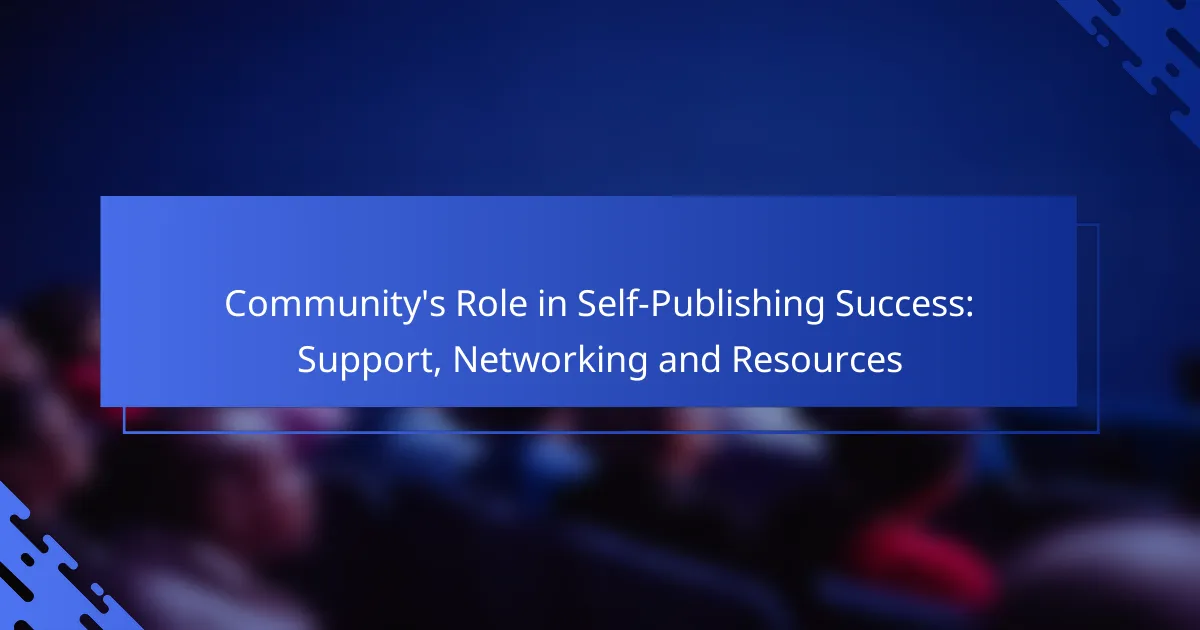The role of community in self-publishing is indispensable, offering essential support, networking opportunities, and resources that can significantly enhance an author’s success. By connecting with fellow writers and industry professionals, self-publishers gain valuable feedback, motivation, and insights that are crucial for navigating the complexities of the publishing landscape. Access to vital resources such as editing services, design tools, and marketing platforms further empowers authors to create polished works that effectively reach their target audiences.
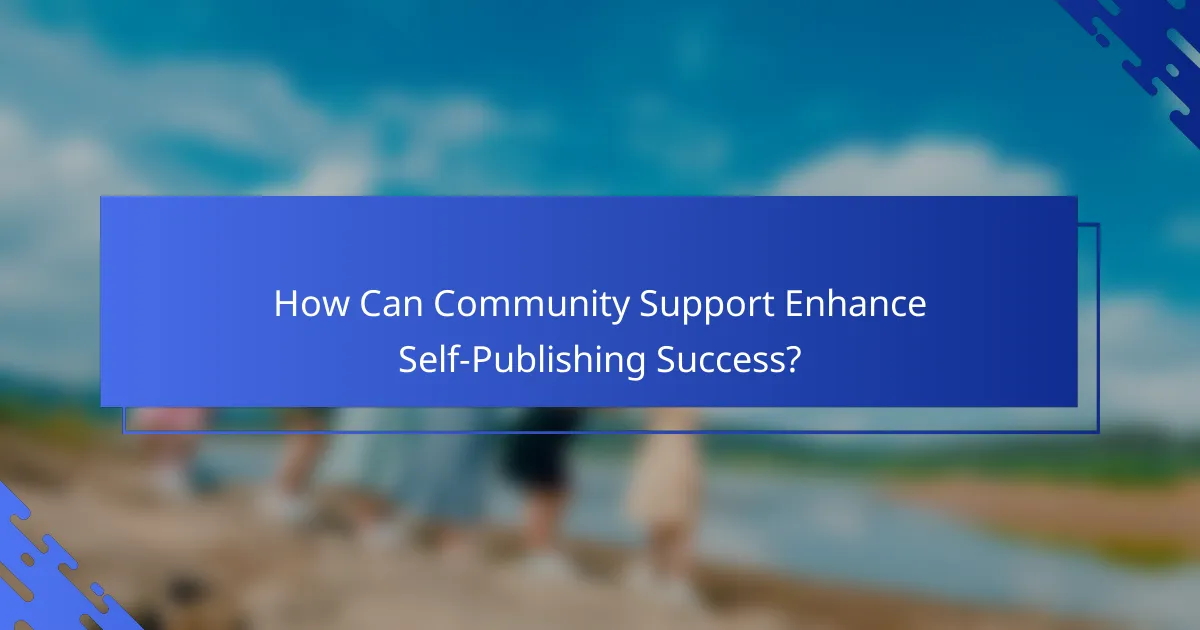
How Can Community Support Enhance Self-Publishing Success?
Community support plays a crucial role in enhancing self-publishing success by providing valuable resources, networking opportunities, and emotional backing. Engaging with a community can lead to better feedback, increased motivation, and shared insights that are vital for navigating the self-publishing landscape.
Access to feedback and critique
Receiving constructive feedback is essential for any self-publishing author. Communities often provide platforms where writers can share their work and receive critiques from peers, which can help refine their writing and improve their final product. Consider joining writing groups or online forums where members regularly exchange manuscripts for review.
When seeking feedback, be open to both positive and negative critiques. Aim to ask specific questions about your work to guide reviewers, such as clarity, pacing, or character development. This targeted approach can yield more actionable insights.
Emotional encouragement and motivation
Self-publishing can be a lonely journey, and emotional support from a community can significantly boost motivation. Connecting with fellow authors who understand the challenges can provide reassurance and encouragement during tough times. Regular check-ins or accountability partnerships can help keep you on track with your writing goals.
Consider participating in community events, such as writing sprints or workshops, to foster a sense of camaraderie. Sharing your struggles and successes with others can create a supportive environment that inspires you to persevere.
Shared experiences and lessons learned
Communities often serve as a treasure trove of shared experiences and lessons learned from others’ journeys in self-publishing. Members can offer insights into effective marketing strategies, distribution channels, and common pitfalls to avoid. Engaging in discussions can help you navigate the complexities of self-publishing more effectively.
Take advantage of resources such as webinars, podcasts, or blogs created by experienced self-publishers within your community. These platforms can provide practical tips and real-world examples that can guide your own publishing efforts.

What Networking Opportunities Exist for Self-Publishers?
Self-publishers can benefit significantly from various networking opportunities that enhance their visibility and access to resources. Engaging with other writers and industry professionals can lead to valuable connections, support, and insights that are crucial for success in the self-publishing landscape.
Online forums and social media groups
Online forums and social media groups provide a platform for self-publishers to connect with peers, share experiences, and seek advice. Websites like Reddit, Facebook, and specialized writing forums host communities where authors can discuss challenges, marketing strategies, and publishing tips.
When participating in these groups, it’s essential to engage actively and contribute valuable insights. Avoid self-promotion unless it is allowed, as this can lead to negative perceptions. Instead, focus on building relationships and offering support to others.
Local writing workshops and meetups
Local writing workshops and meetups offer self-publishers a chance to network face-to-face with fellow writers and industry experts. These events often include writing exercises, feedback sessions, and discussions on publishing trends, which can be incredibly beneficial for honing skills and gaining insights.
To find workshops and meetups, check local libraries, community centers, or writing organizations. Participating in these events can help build a supportive network and may even lead to collaborative opportunities.
Industry conferences and events
Attending industry conferences and events is a powerful way for self-publishers to connect with professionals in the publishing world. These gatherings often feature keynote speakers, panel discussions, and networking sessions that can provide valuable knowledge and contacts.
Look for conferences that focus on self-publishing, such as the Self-Publishing Conference or Book Expo America. When attending, prepare to network by bringing business cards and being ready to discuss your work and goals. Follow up with new contacts after the event to maintain those connections.
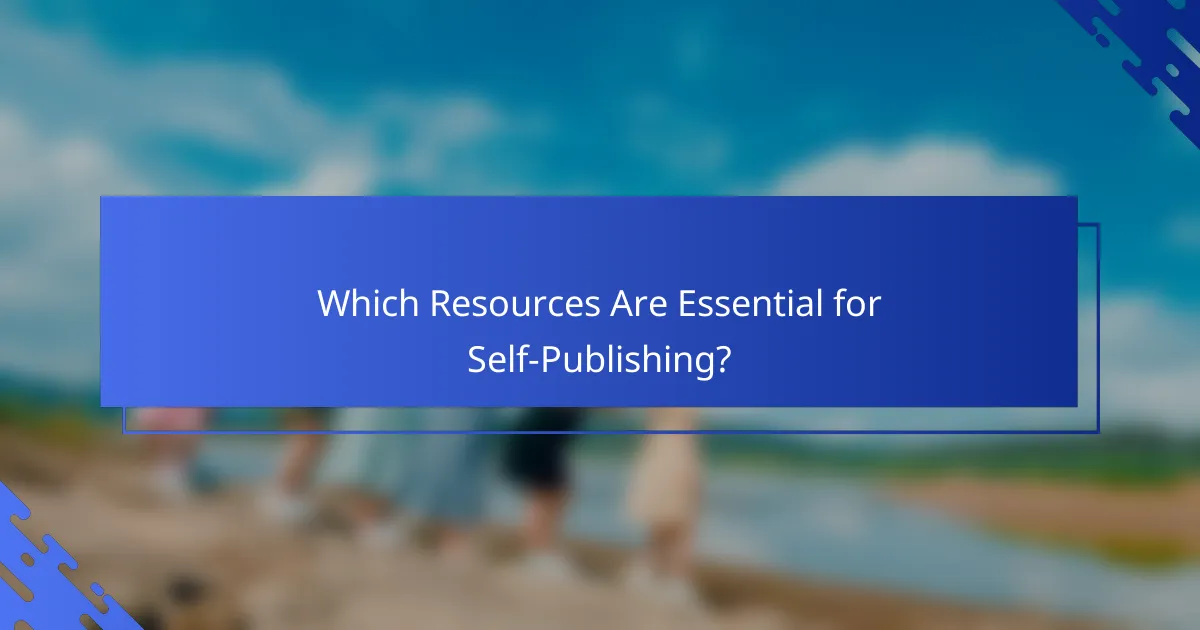
Which Resources Are Essential for Self-Publishing?
Essential resources for self-publishing include editing and proofreading services, design and formatting tools, and marketing and distribution platforms. These resources help ensure your book is polished, visually appealing, and effectively reaches your target audience.
Editing and proofreading services
Editing and proofreading are critical to producing a professional-quality book. Consider hiring a freelance editor who specializes in your genre, as they can provide valuable insights and feedback to enhance your manuscript.
Look for services that offer different levels of editing, such as developmental editing, copyediting, and proofreading. Prices can vary widely, typically ranging from $0.01 to $0.05 per word, depending on the service level and the editor’s experience.
Design and formatting tools
Design and formatting tools are essential for creating an attractive and readable book. Software like Adobe InDesign or Scrivener can help you format your manuscript for print and digital versions, while Canva can assist with cover design.
When choosing tools, consider ease of use and compatibility with your publishing platform. Many self-publishing platforms provide specific formatting guidelines, so ensure your design meets those requirements to avoid costly revisions.
Marketing and distribution platforms
Marketing and distribution platforms are vital for getting your book into readers’ hands. Services like Amazon Kindle Direct Publishing (KDP) and IngramSpark allow you to publish and distribute your book widely, while social media and email marketing can help you build an audience.
Consider using a mix of paid advertising and organic marketing strategies. Setting a budget of around 10-20% of your expected revenue for marketing can be a good starting point. Additionally, engaging with online communities can provide valuable support and networking opportunities.

How Does Collaboration Impact Self-Publishing?
Collaboration significantly enhances self-publishing success by providing authors with support, shared expertise, and expanded reach. Working together allows writers to pool resources, leverage each other’s networks, and create more impactful projects.
Co-authoring projects
Co-authoring projects can lead to richer content and a broader audience. When two or more authors collaborate, they can combine their unique perspectives and skills, resulting in a more engaging narrative or informative guide.
Consider co-authoring a book or a series of articles. This approach not only divides the workload but also allows for cross-promotion among each author’s existing readership. Ensure that all parties agree on roles and responsibilities to avoid conflicts later.
Joint marketing efforts
Joint marketing efforts can amplify visibility for self-published works. By collaborating on promotional activities, authors can reach a larger audience than they could alone. This might include shared social media campaigns, joint book launches, or co-hosted events.
For example, two authors might host a webinar discussing their books, allowing them to tap into each other’s followers. It’s crucial to coordinate messaging and branding to present a unified front to potential readers.
Shared resources and tools
Sharing resources and tools can streamline the self-publishing process. Authors can benefit from each other’s knowledge of editing software, design tools, and publishing platforms, which can save time and reduce costs.
Consider creating a shared document or a resource list that includes useful links and tools. This collaborative approach not only fosters community but also enhances the quality of the final product. Be open to sharing insights and experiences to maximize the benefits of these shared resources.
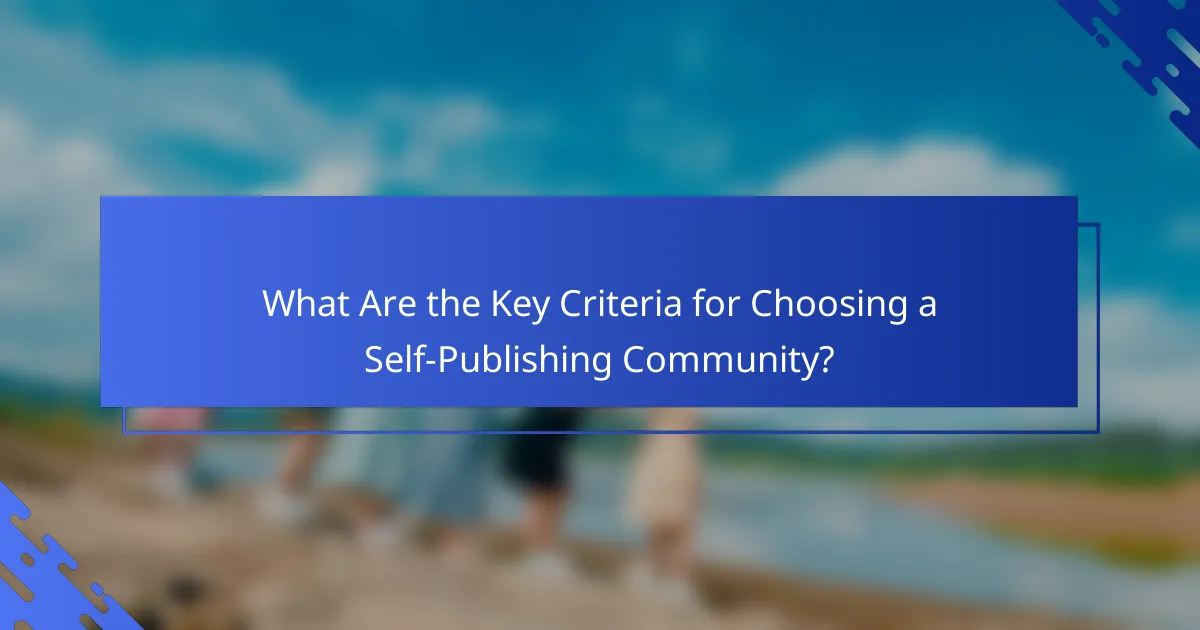
What Are the Key Criteria for Choosing a Self-Publishing Community?
When selecting a self-publishing community, focus on aspects that enhance your writing journey, such as genre alignment, active support, and access to valuable resources. A well-chosen community can provide essential networking opportunities and guidance tailored to your specific needs as an author.
Focus on genre and niche
Choosing a community that aligns with your genre or niche is crucial for relevant feedback and support. Whether you write romance, science fiction, or non-fiction, being part of a group that understands your market can enhance your writing and marketing strategies.
Look for communities that host genre-specific discussions, workshops, or events. This targeted approach helps you connect with readers and fellow authors who share your interests, making it easier to gain insights and build a supportive network.
Active engagement and support
Active engagement within a community is vital for fostering relationships and receiving timely feedback. Seek out groups that encourage participation through discussions, critiques, and collaborative projects, as these interactions can significantly boost your motivation and growth as a writer.
Consider communities that offer regular events, such as writing challenges or Q&A sessions with experienced authors. These opportunities not only provide support but also keep you accountable and engaged in your writing journey.
Access to expert advice and resources
Access to expert advice and resources can greatly enhance your self-publishing success. Look for communities that provide workshops, webinars, or access to industry professionals who can offer insights on writing, editing, and marketing your work.
Additionally, consider communities that compile valuable resources, such as templates for publishing contracts, guides on formatting, or lists of reputable self-publishing platforms. Having these tools at your disposal can streamline your publishing process and help you make informed decisions.
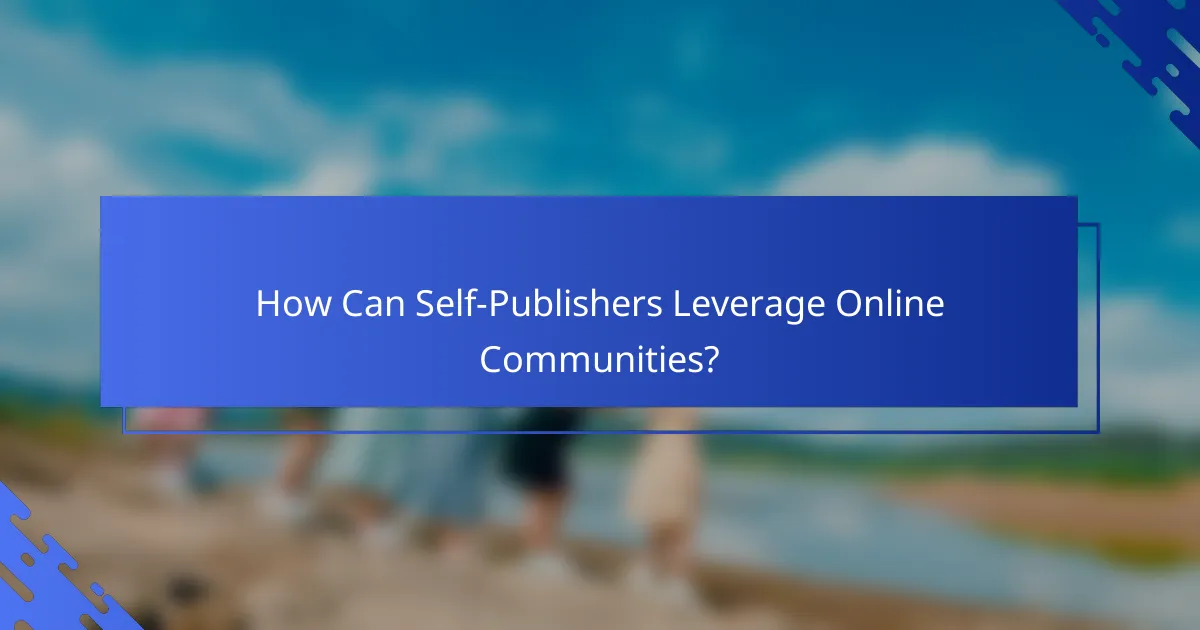
How Can Self-Publishers Leverage Online Communities?
Self-publishers can significantly enhance their success by tapping into online communities for support, networking, and resources. These platforms provide opportunities to connect with fellow authors, engage with readers, and access valuable tools and advice.
Building an author platform
Creating a strong author platform is essential for self-publishers. This involves establishing a professional online presence through a website, social media profiles, and author profiles on platforms like Goodreads or Amazon. A cohesive brand helps readers recognize and engage with your work.
To effectively build your platform, focus on consistent content creation. Share insights about your writing process, book updates, and personal anecdotes that resonate with your audience. Aim for regular posts, whether it’s weekly blog entries or daily social media updates, to keep your followers engaged.
Engaging with readers and fans
Engagement with readers and fans is crucial for self-publishers aiming to build a loyal audience. Interacting through social media, newsletters, and community forums allows authors to foster relationships and receive feedback on their work. This two-way communication can enhance reader loyalty and encourage word-of-mouth promotion.
Consider hosting virtual events such as Q&A sessions, book launches, or live readings to connect with your audience. Offering exclusive content, like sneak peeks of upcoming books or special discounts, can also incentivize engagement. Remember to respond to comments and messages promptly to show appreciation for your readers’ support.
